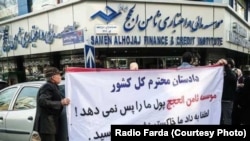An Iranian newspaper’s revelation that the head of a once massive credit institution has been on trial for embezzlement in Tehran has thrust the problem of corruption back into the spotlight for many Iranians.
In an article posted Wednesday, reformist newspaper Shargh Daily said a Tehran court has been conducting an investigation into alleged corruption by Abolfazl Mir-Ali, who served as managing director of the bankrupt Samen al-Hojaj Credit Institution. Mir-Ali’s wife and another associate were named as co-defendants.
Shargh said the court held a ninth hearing in the case this week.
2015 bankruptcy
Samen al-Hojaj went bankrupt in 2015 after having grown rapidly into one of Iran’s biggest private lenders with more than 480 branches since launching in 2001 in the northeastern city of Sabzevar.
The collapse of Samen al-Hojaj and other unregulated private credit institutions in Iran in recent years has triggered frequent public protests by angry depositors demanding their money back and denouncing Iranian authorities for having allowed the institutions to mismanage their funds.
Credit institutions such as Samen al-Hojaj grew their capital by offering Iranians interest rates that were much higher than those set by the Iranian central bank and enabling those depositors to maintain the value of their savings during periods of high inflation.
Shargh Daily said the court found that Samen al-Hojaj also provided tens of millions of dollars’ worth of gifts and favorable loans to government and military officials and celebrities, loans whose interest rates were much lower than the rates offered by Iranian banks. It said such practices contributed to the institution’s demise.
Corruption highlighted
The revelations made #Samen_al-Hojaj the top Farsi-language Twitter hashtag Wednesday, with many Persian Twitter users saying the case highlights the pervasiveness of corruption in Iran.
In the Thursday edition of VOA Persian’s Straight Talk call-in show, most callers from inside Iran shared the same view.
A man who gave his name as Ardeshir in the northwestern city of Khalkhal said he believes corruption is institutionalized in Iran. He said that when a young couple asks for a small loan after marriage, they have to go through a large bureaucracy and sometimes wait months to get the money.
“So how is it possible that certain individuals (as in the Samen al-Hojaj case) can get billions of rials (tens of thousands of dollars) in loans in such a short amount of time?” he asked, incredulously.
Some callers to the show said they believe only Iranians who are well-connected to the country’s powerful governmental, military and clerical institutions enjoy such privileges.
Afshar Sigarchi and Behrooz Samadbeygi of VOA’s Persian Service contributed to this report.




